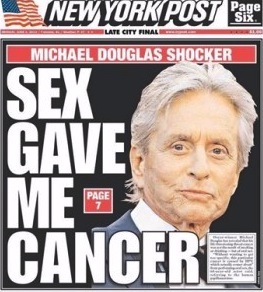
As if facing any cancer isn’t shocking enough, but sex cancer?
From the moment of the first ‘you’ve got cancer’ phone call until this moment, the sense of plague-like certain doom sets in.
Will doom plague the rest of my life from sex cancer? Is so that sucks for me, said every cancer patient in the history of cancer.
Followed by:
How do I shake it, or do I?
Sure it’s a challenge to do something with bad stuff. Just ask your parents if you don’t think so, angel.
But what does a blogger do with bad stuff so close to home I can see the doggie in the window, so close it couldn’t be any closer?
Like hard chargers always say: “Tomorrow’s going to be worse than today, and we still have to do something with it anyway.”
What’s a blogger to do?
Blogger beats sex cancer, now what?
Get an editor and talk about a book idea, what else?
We met for lunch in Beaverton, one of the smartest cities in the world according to boomerpdx on google analytics.
What could go wrong?
I’ve got the topic.
Got the writing habit.
I was hoping for insight and wisdom and got both.
A common truth among writers is everyone needs an editor.
Blogger beats sex cancer on a blog with a world wide reach.
One hit from India is still one more than I had before. I value the heck out of every reader and every comment no matter the origin, just sayin’.
Long time subscribers asked why I did interpretations in some posts.
I said, “To show how easy it is to communicate when that’s the goal.”
When A-list movie star Michael Douglas blamed oral sex for his terrifying bout with potentially deadly throat cancer in 2013, he created a media buzz that left many fans rolling their eyes.
But now research findings suggest he was may have been telling the truth. What’s more, he isn’t alone.
Health statistics in several affluent nations, including the U.S., reveal skyrocketing rates of throat and tongue cancers — often tied to sexually transmitted human papilloma virus (HPV) — among middle-aged people.
The latest research from the Australasian Association of Cancer Registries — a grouping of Australia’s state and territory registries plus neighboring New Zealand’s registry — make clear the connection between HPV and the rising cancer rates.
One goal after a blogger beats sex cancer is working with a writing coach who sees a hard working blogger as an asset.
Another goal, don’t be an ass hat.
Part of the balance is following directions from someone who sees the influences in my work. I read the authors they recommend, the style books they use.
At least I will when I strain a re-write through structural formalities and market based research to find the right balance.
Where do readers find writing that matters?
From writers who don’t throw up blockades and stumbling blocks without telling you.
No one needs a sand trap or water hazard in the middle of a story. Unless it’s a golf story.
This is the story instead:
The star of Basic Instinct and Fatal Attraction also revealed he viewed the world differently after recovering from cancer. In his 2013 interview, the actor said he had checkups every six months but revealed doctors did not expect the illness to return.
“I was just happy to be alive. I was ecstatic,” he said. “It feels like a rebirth after you go through cancer and you come out of it. You feel like you’re a child.
“You see priorities differently,” he added. “You have a much deeper appreciation of marriage, of your children – you see everything a little bit clearer, and a little brighter.”
Douglas initially reported his illness as throat cancer, but later revealed it had been tongue cancer. He said he had lied following word from surgeons that the latter illness could entail radical surgery at a time when he was about to begin promoting a starring role in 2010’s Wall Street: Money Never Sleeps.
Blogger beats sex cancer with the stigma club
I’ve felt it, you’ve felt it, everyone’s felt it: the joy of life after a close call, no matter how close.
A building I stayed in twenty years ago catches on fire?
Could have been me.
An accident happens on a freeway I drove on?
Could have been me.
Then I get HPV16 throat cancer, one I’ve never heard of, one with big numbers of patients predicted in the near future.
Could have been you?
Michael Douglas has revealed that his stage 4 throat cancer was the result of an HPV infection that he got from oral sex. In an interview with the Guardian last Sunday, the 68-year-old actor was asked whether he regretted smoking and drinking, both of which are linked to throat cancer. He answered, “No. Because, without wanting to get too specific, this particular cancer is caused by HPV [human papillomavirus], which actually comes about from cunnilingus.”
About 14,000 throat cancers are diagnosed every year in the US, and about 70 percent of those are related to HPV, the virus most known for causing cervical cancer and anal cancer.
Such throat cancers were far less common 15 years ago, said Dr. Robert Haddad, chief of the center for head and neck oncology at the Dana-Farber Cancer Institute; now, he said, his clinic is “packed with patients” in their 40s and 50s with HPV-related cancers.
“They never smoked, don’t have heavy alcohol use, and often have young children,” he said, which makes it a particularly devastating diagnosis for couples.
Often these cancers aren’t diagnosed until they’ve progressed to surrounding lymph nodes making them harder to cure, but they have a better long-term survival rate compared to those throat cancers triggered by smoking or alcohol use.
Researchers haven’t determined the reason for the quick rise in HPV throat cancers, but it may have something to do with a shift in cultural norms toward more promiscuity when it comes to oral sex or a genetic alteration in the virus that has enabled it to multiply and grow on oral tissue.
Most oral cancers linked to the virus occur on the tonsils or base of the tongue and are caused by the strain HPV-16. The HPV vaccines, Gardasil and Cervarix, protect against this strain and a wider acceptance of the vaccine in children could lead to a decline in this cancer incidence down the road.
“My husband would have gladly had a vaccine when he was 10 if he could have avoided this cancer as an adult,” said Lucy Simotes, whose husband, Tony, was treated at Dana-Farber three years ago when he was 58 for an HPV-related throat cancer. “He had radiation and chemotherapy and was on a feeding tube for 10 months,” she added, because he was unable to swallow food due to side effects from his treatments.
Simotes, who lives in the Berkshires with her husband, worried that she herself might carry the sexually transmitted virus and opted to participate in a study led by Johns Hopkins researchers to study how often the virus gets transmitted orally in long-term partners.
“Spouses of my patients frequently ask me whether they’ll get the cancer too,” said Haddad, who was one of the coauthors of the study. The findings, presented over the weekend at the American Society of Clinical Oncology Annual Meeting, determined that only 7 percent of those whose partners have HPV-related throat cancers had HPV virus that was detected on a throat rinse test.
“We were able to show that spouses and partners of those with these kinds of cancers don’t necessarily have an increased risk of cancer themselves,” Haddad said. “They likely clear the virus from their system.”
Simotes didn’t find out whether she carried the virus, but she says she’s on a mission to make people aware of the benefits of the HPV vaccine. The Centers for Disease Control and Prevention recommends that preteen girls and boys get vaccinated; those playing catchup can get vaccinated through age 26, if they’re a woman, or age 21, if they’re a man.
Only two-thirds of Massachusetts girls ages 13 to 17 have received one dose of the HPV vaccine, according to the latest statistics, and just 47 percent have received all three doses required to give full protection against the virus. For boys, the rates are likely lower since the vaccine was only first recommended for them two years ago.
Boston University researchers recently demonstrated that inoculation rates in two clinics could be raised by teaching pediatricians to place as much emphasis on the importance of the HPV vaccine in their discussions with parents as they do on other immunizations that are required for school entry.
===
I’ve been at a family gathering where one grand uncle shared key chain and watch fob mementos celebrating his new book.
It was a memoir about the adventures of his penis, which was also the subject of the mementos.
Where does anyone find penis mementos, and how do you ask for them?
While I don’t see a book about P16 cancer taking that turn, I do see the effort to ease cancer stigma.


